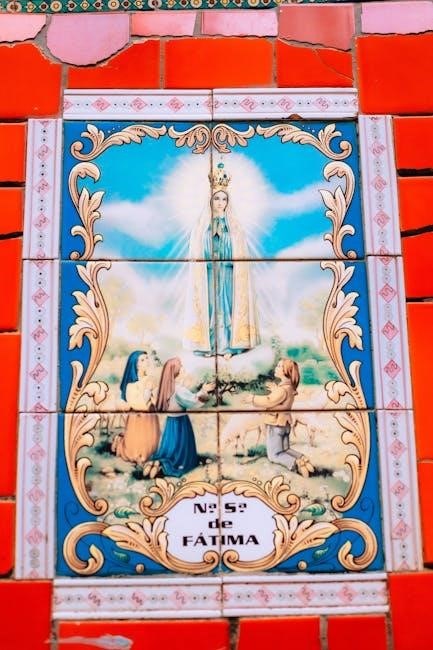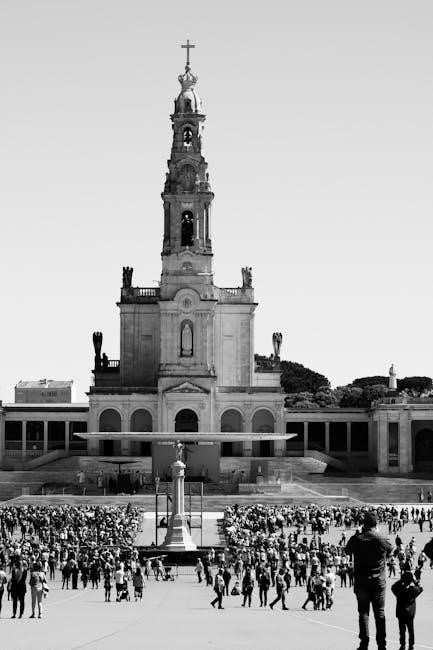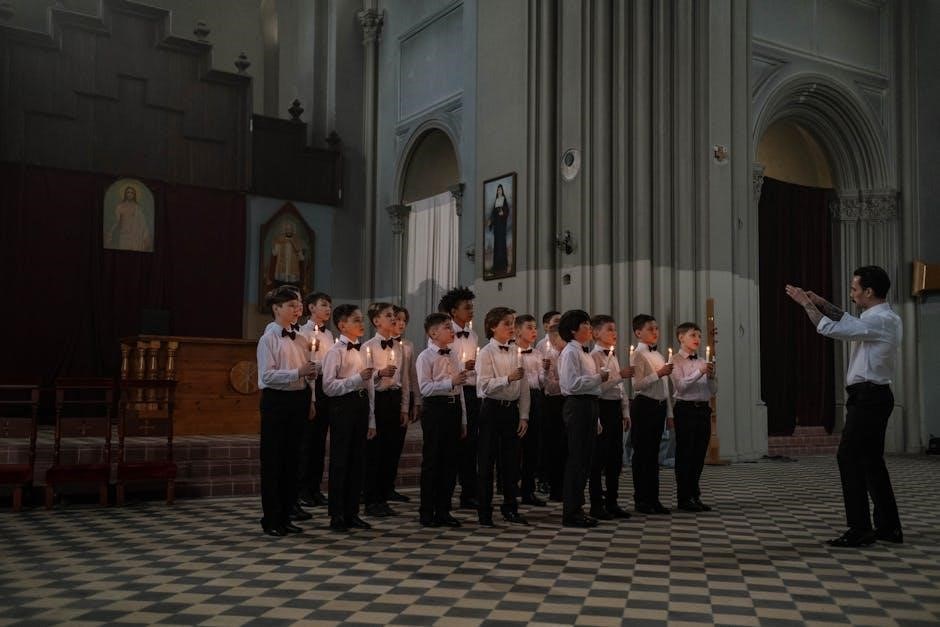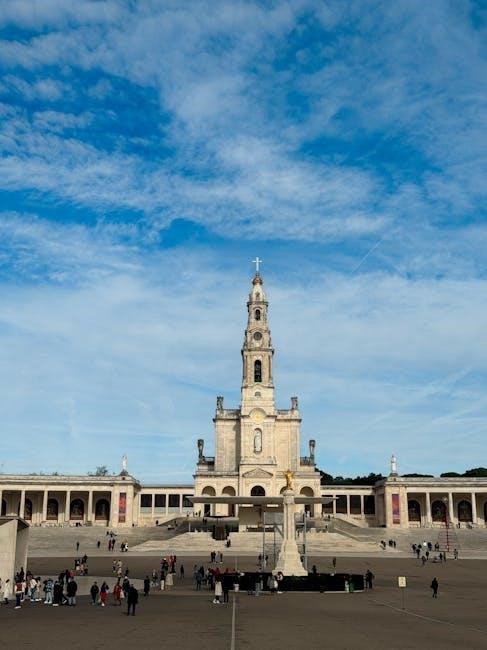The Fatima Prayers, originating from the 1917 Marian apparitions, include five devout prayers taught by the Angel of Peace and Our Lady, emphasizing divine mercy, forgiveness, and spiritual devotion.
Overview of the Fatima Prayers
The Fatima Prayers are a collection of five devotional prayers deeply rooted in Catholic spirituality, associated with the Marian apparitions in Fátima, Portugal, in 1917. These prayers were revealed to three shepherd children by the Angel of Peace and later by Our Lady of Fátima. They emphasize themes of divine mercy, forgiveness, and the importance of prayer and sacrifice for the conversion of sinners. The prayers include the Pardon Prayer, the Angels Prayer, the Rosary Decade Prayer, the Sacrifice Prayer, and the Eucharistic Prayer. Simple yet profound, they reflect core Catholic teachings, particularly regarding the Holy Eucharist and the Immaculate Heart of Mary. Recognized by the Church, these prayers are often recited during the Rosary or as standalone devotions, offering believers a powerful means to grow in faith and devotion to God and Our Lady of Fátima.

Historical Context of the Prayers
The Fatima Prayers are deeply connected to the 1917 Marian apparitions in Fátima, Portugal, where three shepherd children experienced divine revelations. The first two prayers, the Pardon Prayer and the Angels Prayer, were taught by the Angel of Peace in 1916, a year before Our Lady’s appearances. During her apparitions, particularly on July 13, 1917, Our Lady introduced the Rosary Decade Prayer, emphasizing its recitation at the end of each Rosary decade. These prayers were given as a call to repentance, prayer, and sacrifice, reflecting the Catholic Church’s teachings on mercy, forgiveness, and the Immaculate Heart of Mary. The prayers gained widespread recognition and have since become integral to Fátima devotions, inspiring countless believers to deepen their spiritual lives and seek divine mercy.
The Core Fatima Prayers
The Fatima Prayers consist of five central prayers: The Pardon Prayer, The Angels Prayer, The Rosary Decade Prayer, The Sacrifice Prayer, and The Eucharistic Prayer, each reflecting deep spiritual devotion.
The Pardon Prayer
The Pardon Prayer, taught by the Angel of Peace in 1916, is a heartfelt plea for divine forgiveness. It begins with a profession of faith: “My God, I believe, I adore, I hope, and I love Thee!” The prayer then asks pardon for those who do not believe, adore, hope, or love God. This prayer emphasizes intercession for others, reflecting the themes of mercy and compassion central to the Fatima message. It is often recited during the Rosary and is a powerful expression of devotion, encouraging believers to seek forgiveness and pray for the conversion of sinners. The Pardon Prayer reminds us of our duty to intercede for others and to seek God’s mercy in a world in need of spiritual healing.

The Angels Prayer
The Angels Prayer, also known as the “Most Holy Trinity Prayer,” was taught to the children of Fatima by the Angel of Peace in 1916. It is a profound expression of adoration and offering to the Most Holy Trinity. The prayer begins with the words, “Most Holy Trinity, Father, Son, and Holy Spirit, I adore Thee profoundly.” It offers the Body, Blood, Soul, and Divinity of Jesus Christ in atonement for the sins of the world and for the conversion of sinners. This prayer emphasizes the importance of sacrifice and reparation, reflecting the Angel’s message to the children to pray and offer sacrifices for sinners. The Angels Prayer is often recited during the Rosary and is a beautiful way to deepen devotion to the Holy Trinity and the Eucharist, embodying the spiritual essence of the Fatima apparitions.

The Rosary Decade Prayer
The Rosary Decade Prayer, also known as the “Oh My Jesus” prayer, was taught to the children of Fatima by Our Lady during her apparition on July 13, 1917. She requested that this prayer be recited at the end of each decade of the Rosary. The prayer reads: “Oh, My Jesus, forgive us our sins, save us from the fires of Hell, lead all souls to Heaven, especially those in most need of Thy mercy.” This prayer emphasizes the importance of seeking forgiveness, avoiding eternal damnation, and interceding for the salvation of all souls, particularly those most in need of divine mercy. It is a powerful expression of devotion to Jesus Christ and reflects the core message of Fatima, which stresses prayer, sacrifice, and the salvation of souls. This prayer is deeply intertwined with the Fatima devotions and is widely recited by the faithful worldwide.
The Sacrifice Prayer
The Sacrifice Prayer, rooted in the Fatima message, was taught to the children by the Angel of Peace in 1916. It begins with “O Jesus, it is for love of Thee…” and is prayed during acts of sacrifice, offering suffering for the conversion of sinners and reparation for offenses against the Immaculate Heart of Mary. This prayer reflects the Fatima emphasis on sacrifice and penance as means of spiritual growth and divine mercy. It encourages believers to embrace sacrifices willingly, uniting them with Christ’s redemptive mission. The prayer’s simplicity and depth make it a powerful tool for those seeking to live out the Fatima message in their daily lives, fostering a spirit of self-giving love and devotion. Its recitation is a meaningful way to honor the requests of Our Lady of Fatima and to seek grace for oneself and others; It remains a cherished prayer among Fatima devotees worldwide.
The Eucharistic Prayer
The Eucharistic Prayer is one of the Fatima Prayers, rooted in the apparitions and teachings of the Angel of Peace. It begins with “Most Holy Trinity, I adore Thee! I offer Thee the most precious Body, Blood, Soul, and Divinity of Jesus…” This prayer is a profound act of worship, emphasizing the sacredness of the Holy Eucharist and the believer’s devotion to the Holy Trinity. It reflects the Catholic Church’s teachings on the Real Presence of Christ in the Eucharist and is often prayed during Mass or in Eucharistic adoration. The prayer’s focus on offering Jesus’ sacrifice for sinners highlights the importance of mercy and reparation, aligning with the Fatima message of prayer and penance. Its recitation fosters a deeper connection to the Eucharist and the divine, making it a cherished part of Fatima devotions. It is a simple yet powerful expression of faith and love for God.

How to Pray the Rosary with Fatima Prayers
To pray the Rosary with Fatima Prayers, recite the traditional prayers and add the Fatima Prayers at the end of each decade, as requested by Our Lady.

Steps to Incorporate Fatima Prayers into the Rosary
Begin the Rosary with the Apostles’ Creed, followed by the traditional prayers. After each decade, recite the Fatima Rosary Decade Prayer: “O my Jesus, forgive us our sins, save us from the fires of Hell, lead all souls to Heaven, especially those in most need of Thy mercy.” Conclude each decade with this prayer. Additionally, the Pardon Prayer and Sacrifice Prayer can be incorporated after the Apostles’ Creed or during meditation between decades. The Angels Prayer and Eucharistic Prayer may also be added as reflections. This method enriches the Rosary with the spiritual depth of Fatima, focusing on mercy, forgiveness, and devotion to the Holy Trinity and the Immaculate Heart of Mary.
Significance of the Rosary in Fatima Devotions
The Rosary holds a central place in Fatima devotions, as Our Lady of Fatima repeatedly emphasized its importance during her apparitions in 1917. She urged the three shepherd children to pray the Rosary daily for peace, the conversion of sinners, and the triumph of her Immaculate Heart. The Rosary serves as a powerful instrument of prayer, combining meditation on the mysteries of Christ with intercession for others. By reciting the Rosary, devotees connect with the divine plan revealed at Fatima, fostering a deeper relationship with Mary and Jesus. The Rosary also complements the Fatima Prayers, such as the Rosary Decade Prayer, which Our Lady taught the children to pray at the end of each decade. This practice strengthens the spiritual bond between the Rosary and the Fatima message, making it a cornerstone of Fatima spirituality and a global devotion inspired by the apparitions.

Benefits and Significance of Fatima Prayers
The Fatima Prayers foster spiritual growth, emphasizing divine mercy, forgiveness, and devotion, while offering profound solace and strength to believers seeking a deeper connection with God and Mary.
Spiritual Growth Through Fatima Prayers

The Fatima Prayers are a powerful means of fostering spiritual growth by deepening one’s relationship with God and the Virgin Mary. These prayers, rooted in the apparitions of 1917, emphasize themes of mercy, forgiveness, and devotion. By reciting them, believers can cultivate a profound sense of humility and contrition, essential for spiritual development. The Pardon Prayer, for instance, encourages believers to seek forgiveness for themselves and others, while the Angels Prayer fosters adoration of the Holy Trinity. Regular recitation of these prayers helps individuals grow in virtue, leading to a more Christ-centered life. The prayers also inspire self-reflection and a commitment to acts of sacrifice and reparation, further enriching one’s spiritual journey. Through this devotion, many have reported experiencing inner peace and a deeper connection to the divine, making the Fatima Prayers a timeless treasure for spiritual enrichment.
Importance of Mercy and Forgiveness in Fatima Devotions
Mercy and forgiveness are central themes in the Fatima Prayers, reflecting Our Lady’s call for humanity to turn to God with repentant hearts. The Pardon Prayer, taught by the Angel of Peace, emphasizes seeking forgiveness for those who do not believe or adore God. This prayer highlights the importance of interceding for others, fostering a spirit of compassion and divine mercy. Similarly, the Sacrifice Prayer encourages offering sacrifices for sinners, underscoring the need for reparation and forgiveness. These prayers remind believers of the necessity of living in a state of grace and extending God’s mercy to others. By prioritizing mercy and forgiveness, the Fatima Prayers guide devotees to align their hearts with God’s will, contributing to the salvation of souls and the triumph of the Immaculate Heart of Mary.
The Fatima Prayers, rooted in the 1917 apparitions, emphasize divine mercy, forgiveness, and spiritual growth, guiding believers to live in harmony with God’s will and seek His infinite grace.
Final Thoughts on the Fatima Prayers
The Fatima Prayers, rooted in the 1917 apparitions, offer profound spiritual guidance, emphasizing mercy, forgiveness, and devotion to the Holy Trinity and the Eucharist. These prayers, taught by the Angel of Peace and Our Lady, are simple yet deeply meaningful, fostering a closer relationship with God; They inspire believers to seek forgiveness for others, offer sacrifices for sinners, and cultivate virtues like hope and love. The prayers’ focus on mercy and reparation aligns with the Catholic Church’s teachings, making them a powerful tool for spiritual growth. Their accessibility ensures anyone can pray them, regardless of their faith journey. Embracing the Fatima Prayers enriches one’s spiritual life and deepens their connection to the divine, embodying the timeless message of Fatima.

Encouragement to Practice the Prayers
Practicing the Fatima Prayers is a beautiful way to deepen your faith and connect with the divine. These prayers, rooted in the apparitions of 1917, offer a simple yet profound way to seek forgiveness, express devotion, and intercede for others. By incorporating them into your daily routine, you can strengthen your spiritual life and grow closer to God. The Fatima Prayers remind us of the importance of mercy, sacrifice, and love, inspiring us to live with greater compassion and purpose. Whether prayed individually or with others, these prayers foster a sense of unity and renewal. Embrace them as a meaningful way to honor the message of Fatima and to bring peace and grace into your life and the world around you.